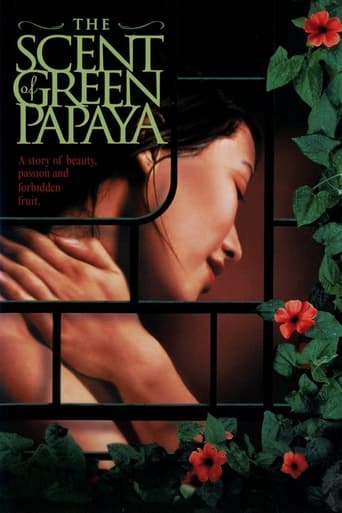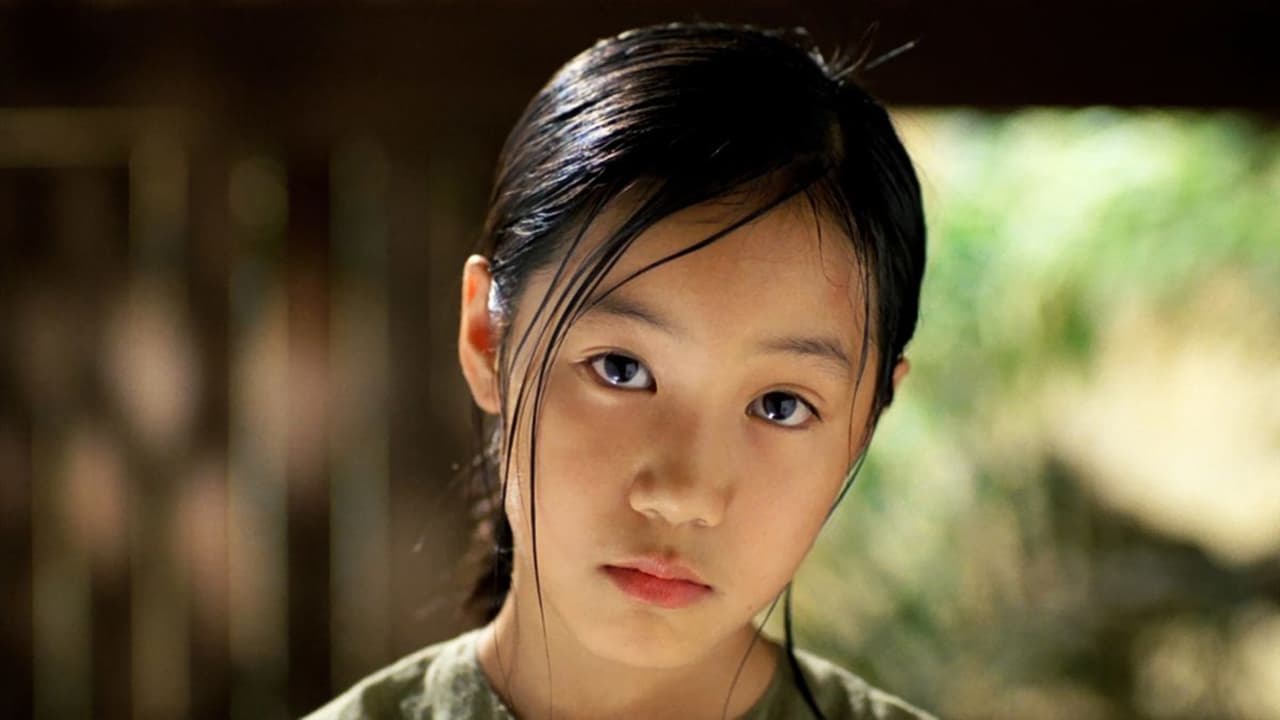Sachin Chavan
Another beautiful film. Slow metamorphosis of a house servant girl in prewar Vietnam. Wonderful cinematography and effective characterisation. The detailing of the set takes the cake. A delightful experience for those who like to savour a movie like classic tea or wine. Rich on the senses and soothing on the mind. Mindfulness!
orinocowomble
If your taste runs to action blockbusters, this film is not for you. The Scent of Green Papaya is the sort of film that repays patient observation, and lends itself to repeated viewings. I'm not an "intellectual"--I will admit I had to take a couple of runs at this film before I understood what I was seeing. The first time, I turned it off 20 min. into it, saying, "Nothing's happening here!" That's true, if you're used to Western films that are driven by action and dialog. Like many Asian films, TSOGP is instead driven by inter-action between characters and observation. The camera functions as an "eye" to show us life from the character's point of view. After seeing the entire film, I became aware that it had become a part of my mental furnishings; I realised I was spending quite a lot of time thinking about it in the following days. I'm told by those who live with me that the highest compliment I can give a film are the words, "I need to see it again." And I do--I need to buy a copy and see it several more times.Ten year old Miu is sent from her home village to Saigon to work as a servant in a cloth merchant's household. She is fascinated by their beautiful home and its furnishings, the papaya tree in the courtyard, and how very different their lifestyle is to what she has known. The youngest son of the family sees her arrival as a golden opportunity--at last someone is lower on the family totem-pole than himself, and he tries to bully Miu in various ways. However, his attempts fall flat as he never gets much of a reaction; in her innocence, Miu accepts events as they come, never trying to assign blame or "tell" on him. If a jar gets broken, she accepts it is her fault; if a pail of dirty water gets upended or "someone" pees all over a clean floor, she cleans it up without a word. Her employer's wife soon sees her as a surrogate daughter, someone to fill the void of her own daughter's death and her own loveless marriage to a spendthrift husband who abandons the family for weeks at a time and comes home empty handed.Ten years later, Miu is sent to work for a family friend, a young man she has long admired. His relationship with a spoiled girl of his own class flickers out as he becomes more aware of Miu's quiet presence in his life. All of the "action" of the film is crammed into the last 30 min, as we see the results of his growing awareness and its transforming effect. The film is stunning to look at, as usual in much of Asian cinema. If I had one complaint, it was the soundtrack; not the traditional Vietnamese music played by father and son at the beginning of the story, but the tortuous "contemporary" Western music in the second half, including a dreadful rendition of Debussy's Claire de Lune--as if an alley cat were trying to play the violin on its own cat-guts. The caterwauling added nothing to the film, and only served as an irritating distraction. This is what caused me to lower my rating of this otherwise fine film.
bastard wisher
"Cyclo", the film Tran Ahn Hung made following this, his debut, is one of my all-time favorite films. This film isn't bad at all, but nowhere close to that masterpiece. No question Tran Ahn Hung is a very good filmmaker, but this wasn't quite compelling enough. Pretty to look at, but not a whole lot else. Ultimately I think the film is just slightly too subdued for it's own good, and threatens to disappear into it's own poetic reverie. Also, at times the film was distractingly stagey, not surprising considering that it was shot entirely on a set. Particularly problematic were the outdoor scenes, although there weren't very many of them.
Howard Schumann
In Tran Anh Hung's debut film The Scent of Green Papaya, Mui (Lu Man San) is a ten-year old girl who comes from a small village to the home of a wealthy Saigon merchant to work as a servant in 1951. The first Vietnamese film ever nominated for an Academy Award as Best Foreign Language Film, Scent of Green Papaya captures the natural beauty of pre-war Vietnam, even though it was filmed on a set constructed in a Paris studio. Mui personifies the innocence of a Vietnamese society where grace and harmony has not yet given way to bombs and destruction. Mui accepts her place with patience, serving the meals, preparing the vegetables, scrubbing the floors, and polishing the shoes.True to the Buddhist ideal of being in the present moment, Mui studiously carries out her tasks, refusing to be affected by the torments of the younger son Tin (Gerard Neth), upset over his father's desertion of the family. She observes her natural surroundings in great detail: ants carrying a small piece of bread, a frog sitting on a leaf, a cricket jumping at night, and the seeds of a green papaya. The mother (Thi Loc Truong) is distraught over the recent death of her young daughter To and looks upon Mui as her replacement, perhaps even her reincarnation. In one scene, the mother stands over Mui while she sleeps and weeps silently for the loss of her daughter and perhaps for a Vietnam that she knows will soon disappear.Her husband (Ngoc Trun Tran) is a drinker and womanizer who has run off with the family's money. The mother is stoic and we only hear about her problems through the elderly grandmother (Thi Hai Vo) who mourns her dead husband alone in her upstairs room. The second part of the film shifts ten years into the future. Mui (Tran Nu Yen-Khe) has become a young woman. Because of the family's financial condition she has moved to the house of Khuyen, a professional musician and composer (Vuong Hoa Hoi). Her leaving triggers in the mother a profound sense of loss for her "daughter" and a sense that the old way of life in her country is coming to a permanent end.In her new house, Mui must contend with the musician's Westernized fiancé who personifies the artificiality of modern society. Annoyed with the insensitivity of his fiancé, Khuyen sees Mui with fresh eyes and begins to realize how much she embodies the traditional values he has left behind. Though the film may try the patience of Western audiences, The Scent of Green Papaya, in its simplicity and awareness of the natural world, reminds us of the power of cinema to reach artistic heights.


 AD
AD



